Welcome to Your Guide to the Best Wine Clubs!
Hello, wine explorers! Lily Tran here, your WSET Level 3 expert, and today, we’re diving into a topic that combines convenience, discovery, and delightful sips: the best wine clubs.
In our busy lives, the idea of having expertly curated wines delivered right to your doorstep is incredibly appealing. But with so many wine clubs flooding the market, each promising the “perfect” selection, how do you choose the one that truly fits your palate, your budget, and your lifestyle? It can feel overwhelming, like navigating a massive wine aisle blindfolded!
I remember when wine clubs first started gaining traction. As someone constantly seeking new and exciting wines, the concept was thrilling. However, not all clubs are created equal. I’ve personally signed up for (and sometimes quickly canceled) several over the years, learning firsthand what makes a wine club truly stand out, and what simply doesn’t deliver on its promises. From mass-market selections to niche, sommelier-curated boxes, I’ve tasted through a significant portion of what’s out there.

This guide is designed to cut through the noise and provide you with expert, unbiased recommendations. Whether you’re a complete novice looking to learn, an experienced enthusiast craving unique finds, or simply someone who enjoys a consistent supply of quality everyday wines, there’s a wine club out there for you.
In this comprehensive review, I’ll go beyond basic listings to provide:
- A deep dive into the real benefits of joining a wine club.
- My WSET-informed criteria for evaluating wine clubs.
- Detailed reviews of the best wine clubs across various categories (overall, value, premium, discovery, etc.), including their pros, cons, and ideal target audience.
- Practical advice on how to choose the perfect wine club for your specific needs.
So, get ready to uncork a world of convenience and discovery. Let’s find your ideal wine club and elevate your home wine experience!
Why Join a Wine Club? The Benefits Beyond Just Wine Delivery
At first glance, a wine club might seem like just another subscription service. But for wine lovers, the benefits extend far beyond simply having bottles delivered to your door. When you join one of the best wine clubs, you’re unlocking a host of advantages that can transform your wine journey.
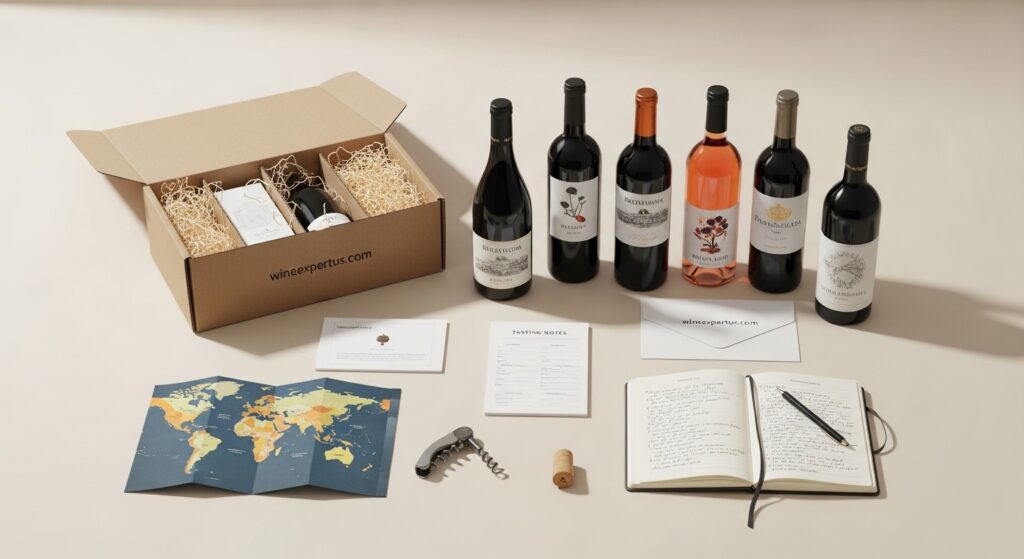
More than just wine: Unpacking the many advantages of a wine club subscription.
Convenience & Curation
- Effortless Discovery: No more wandering aimlessly through crowded wine aisles, feeling overwhelmed by choices. Wine clubs do the heavy lifting for you, curating selections based on your preferences or their expert recommendations.
- Time-Saving: Your wine arrives on a regular schedule, saving you trips to the store. Perfect for busy individuals who still want quality wine at home.
- Perfect Pairings (Sometimes): Many clubs provide tasting notes and even food pairing suggestions, making your wine experience more complete and enjoyable.
Discovery & Education
- Expand Your Palate: Clubs expose you to new varietals, regions, and styles you might never pick up on your own. This is invaluable for expanding your wine knowledge and appreciation.
- Guided Learning: Tasting notes often include details about the wine’s origin, producer, winemaking techniques, and flavor profile. It’s like having a mini-WSET lesson with every bottle!
- Access to Boutique Wines: Many clubs have relationships with smaller, independent wineries, giving you access to unique or limited-production wines that aren’t available in your local shops.
Savings & Exclusivity
- Competitive Pricing: Clubs often negotiate better prices with wineries, passing those savings on to you compared to buying individual bottles at retail.
- Member Discounts: Many offer exclusive discounts on additional bottle purchases, gifts, or merchandise.
- Exclusive Access: Some clubs provide early access to new releases, limited-edition wines, or special events.
Community & Connection
- Online Forums & Events: Some clubs foster a community among members through online platforms, virtual tastings, or even in-person events.
- Direct-to-Consumer Connection: You often get to learn directly about the winemakers and their stories, fostering a deeper connection to the wine.
Lily’s Personal Take on Joining a Wine Club
I’ve seen firsthand how a well-chosen wine club can transform someone’s relationship with wine. For my friend who felt intimidated by the wine aisle, her first wine club delivery was a revelation. It gave her confidence in her choices and opened her eyes to grapes and regions she’d never considered. For more seasoned enthusiasts, it’s a fantastic way to access rare finds or delve deeper into specific interests without the extensive research. It’s about building confidence and expanding horizons, one delicious bottle at a time.
How We Evaluated the Best Wine Clubs: Lily’s Criteria
Choosing the best wine clubs requires a systematic approach. As a WSET-trained expert, I apply a set of rigorous criteria that goes beyond basic price points to assess the true value and experience each club offers.
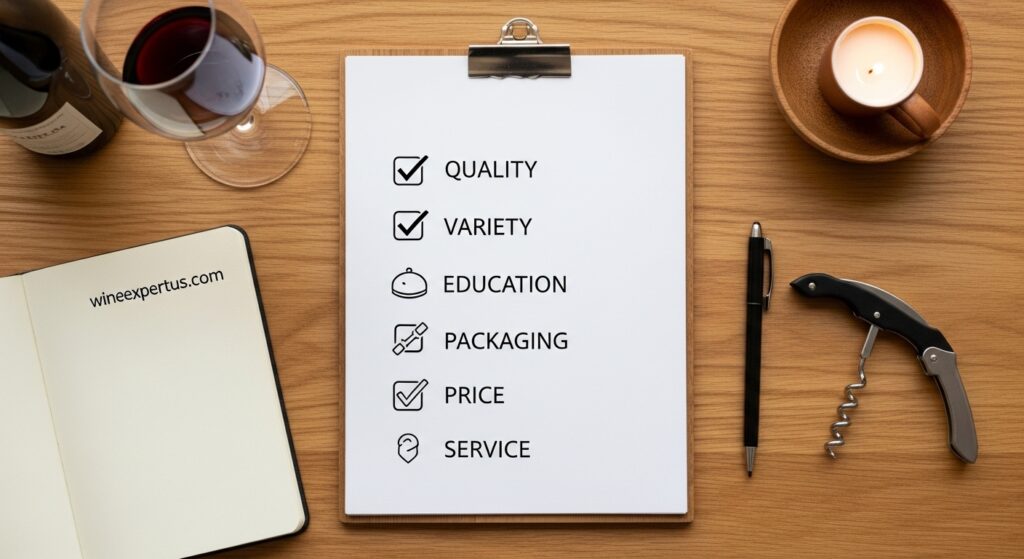
- Lily’s Insight: Think of this as my sommelier checklist for subscription services. It’s not just about what’s in the bottle, but the entire journey.
1. Wine Quality & Curation
- Expert Sourcing: Are the wines selected by qualified sommeliers, winemakers, or experienced buyers? Do they have a clear philosophy for their selections?
- Variety & Uniqueness: Does the club offer a good range of varietals, regions, and styles? Are there unique, hard-to-find wines, or are they easily available at your local grocery store?
- Consistency: Is the quality consistently high across shipments?
- My Assessment: This is paramount. Even the cheapest club should deliver wines that are well-made and enjoyable for their price.
2. Customization & Personalization
- Palate Quiz/Preferences: Does the club offer a robust quiz to understand your preferences (e.g., sweet vs. dry, red vs. white, oaked vs. unoaked)?
- Ability to Adjust Shipments: Can you easily skip shipments, change frequencies, or swap out bottles you don’t want?
- Rating System: Does the club use a rating system to fine-tune future selections based on your feedback?
- My Assessment: High levels of personalization prevent “wine club fatigue” and ensure you’re getting wines you’ll actually enjoy.
3. Value for Money
- Price Per Bottle: How does the average price per bottle compare to retail? Are there significant savings?
- Introductory Offers: Are the initial deals genuinely good, or just a hook?
- Member Perks: Are there discounts on additional purchases, free shipping, or other valuable benefits?
- My Assessment: Value isn’t just about being cheap; it’s about the quality and experience you get for the price you pay.
4. Flexibility & Convenience
- Subscription Model: Is it monthly, quarterly, or customizable? Can you pause or cancel easily?
- Delivery Options: Are there flexible delivery schedules? Do they require a signature for delivery?
- User Interface: Is the website/app user-friendly and intuitive for managing your account?
- My Assessment: A good wine club should adapt to your lifestyle, not the other way around.
5. Customer Service & Community
- Responsiveness: How easy is it to get in touch with customer support? Are they helpful and knowledgeable?
- Educational Content: Do they provide useful tasting notes, articles, or videos?
- Community Features: Are there opportunities to connect with other members or winemakers?
- My Assessment: Excellent support enhances the overall experience and builds trust.
6. Shipping & Packaging
- Secure Packaging: Are the bottles securely packed to prevent breakage?
- Temperature Control: For sensitive wines (especially in hot climates), is temperature-controlled shipping offered or available?
- Shipping Costs: Are shipping fees transparent and reasonable?
- My Assessment: A broken bottle or spoiled wine negates all other benefits.
By applying these criteria, I’ve meticulously reviewed the market to bring you a curated list of the best wine clubs that truly stand out.
Top Picks: The Best Wine Clubs for Every Palate & Budget
Based on my comprehensive evaluation using the criteria above, here are my top recommendations for the best wine clubs available in the US, categorized to help you find your perfect match.
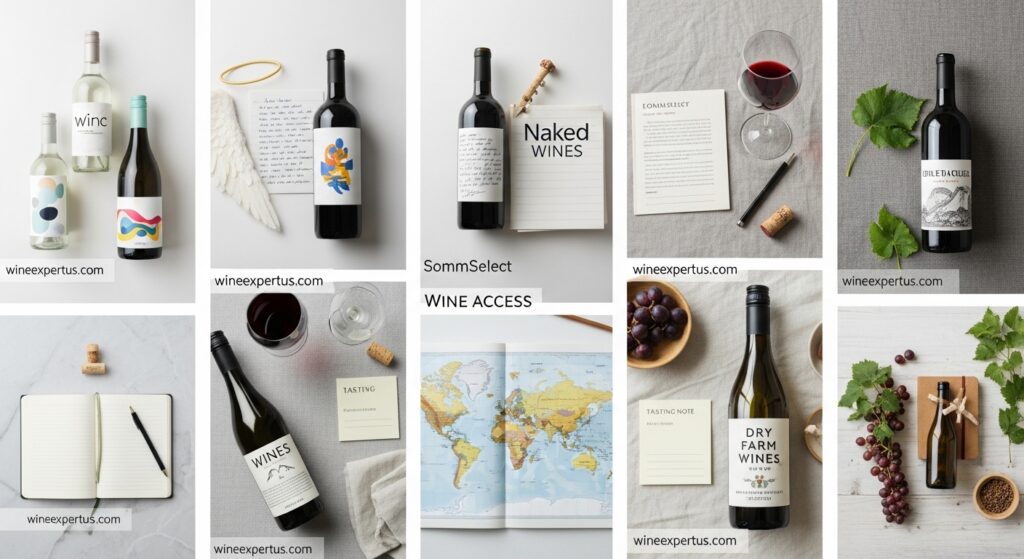
My top recommendations: The best wine clubs for every taste and budget, reviewed by an expert.
Best Overall & For Discovery: Winc
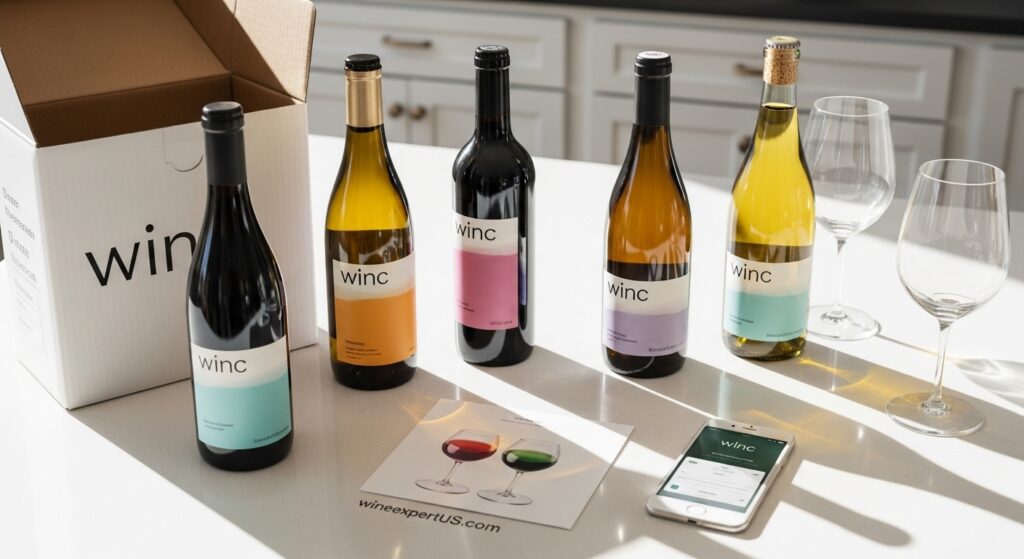
Winc (formerly Club W) focuses on making wine discovery easy and accessible through a personalized quiz and a constantly evolving selection of mostly exclusive wines. They craft many of their wines in-house or collaborate directly with growers.
- Pros:
- Excellent Personalization: Their initial “Palate Profile” quiz is one of the best, effectively recommending wines you’ll likely enjoy.
- Discovery Focus: Constantly introduces new varietals and blends, perfect for expanding your horizons.
- Modern & User-Friendly: Clean website and engaging app for rating wines and managing shipments.
- Good Value: Bottles typically range from $13-$20, offering solid quality for the price.
- Engaging Content: Good tasting notes and a story behind each wine.
- Cons:
- Limited Brands: Primarily features Winc’s own labels, so you won’t find major retail brands. This can be a pro for discovery, a con for brand loyalists.
- Subscription Model: While flexible, you need to remember to skip if you don’t want a shipment.
- Best For: New wine drinkers, those looking to easily discover new styles, or anyone who enjoys a personalized and modern wine experience.
Best for Value & Everyday Drinking: Naked Wines
Naked Wines operates on a unique “Angel” funding model, where members (Angels) invest a small monthly amount, which then gives them access to exclusive, high-quality wines at significantly reduced prices (up to 40-60% off retail). This directly supports independent winemakers.
- Pros:
- Exceptional Value: You get access to premium wines at incredibly low prices once you’re an Angel.
- Direct Winemaker Support: A great concept for supporting independent producers.
- Strong Community: Very active online community where you can interact with winemakers and other Angels.
- High Quality for Price: Often punches above its weight in terms of quality.
- Flexibility: Your monthly investment is essentially credit that never expires.
- Cons:
- “Angel” Commitment: Requires a monthly $40 contribution to unlock the best prices. This might feel like a commitment for some.
- Curated vs. Personalized: While you can choose your wines, the selection is curated by the winemakers working with Naked, rather than a personalized quiz.
- Best For: Value-conscious drinkers, those looking for everyday quality, and anyone who wants to directly support independent winemakers.
Best for Premium & Curated Selections: SommSelect
Founded by Master Sommelier Ian Cauble, SommSelect is renowned for its highly curated, often rare, and always interesting wine selections. Each month features specific themed packs (e.g., “Drinking Burgundy,” “Exploratory Reds”), often focusing on Old World wines and unique finds.
- Pros:
- Exceptional Curation: Hand-picked by a Master Sommelier, ensuring top-tier quality and unique discovery.
- High-Quality Wines: Focuses on wines with character, balance, and often age-worthiness.
- Educational: Provides incredibly detailed tasting notes, producer information, and regional context.
- Access to Rarities: Often features wines that are hard to find elsewhere.
- Cons:
- Higher Price Point: Reflects the premium quality and curation, generally $25-$50+ per bottle.
- Less Personalization: You choose a themed pack, not individual wines based on a quiz. This is for those who trust expert curation.
- Can Sell Out: Popular packs can go quickly.
- Best For: Serious wine enthusiasts, those who trust expert curation, collectors, and anyone looking for unique, high-quality, and often Old World wines.
Best for Learning & Exploring Global Regions: Wine Access
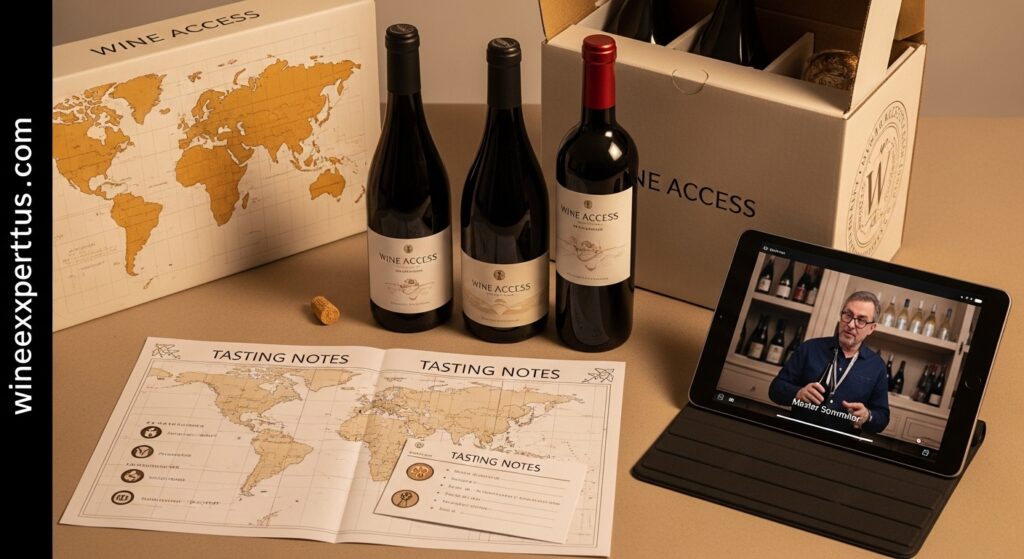
Wine Access combines expert curation with a strong educational component. They offer various club options (e.g., Discovery Club, Connoisseurs Club) or allow you to buy individual bottles. Their strength lies in providing context for each wine, often with video tasting notes from Master Sommeliers.
- Pros:
- Outstanding Educational Content: Video tasting notes, detailed stories, and regional insights accompanying each wine. Perfect for learning.
- Diverse Selection: Explores wines from top regions worldwide, focusing on quality producers.
- Sommelier-Approved: Selections are vetted by top wine professionals.
- Flexible Options: Choose a club or buy à la carte.
- Cons:
- Price: Quality comes at a price; generally in the mid-to-high range.
- Less Customization for Club: Clubs are curated, not based on a personal palate quiz.
- Best For: Wine students (like WSET candidates!), curious explorers, and anyone who values detailed information and context with their wine.
Best for Old World & European Focus: Cellar 503
Cellar 503 specializes in wines from Oregon, but for their European club offerings (e.g., “From the Cellar”), they provide an excellent gateway to curated selections from smaller, often family-owned European producers. While primarily known for Oregon, their commitment to boutique, high-quality selections extends.
- Pros:
- Focus on Small Producers: Access to unique, often sustainable, wines that you won’t find in big stores.
- Strong Educational Focus: Detailed tasting notes and winemaker stories.
- Excellent Customer Service: Known for a personal touch.
- Curated European Selections: Great for exploring authentic Old World wines.
- Cons:
- Primary Focus Oregon: While they have European clubs, their main identity is Oregon wine.
- Less Personalization: Curated selections.
- Slightly Higher Price: Reflects the boutique nature of the wines.
- Best For: Those who want to explore authentic, often sustainable, wines from specific European regions and support smaller producers.
Best for Sustainable & Organic Wines: Dry Farm Wines
Dry Farm Wines focuses exclusively on natural, organic, biodynamic, and dry-farmed wines. They promise wines that are sugar-free, low alcohol, and free of additives, catering to a health-conscious or natural wine-loving audience.
- Pros:
- Strict Criteria: Rigorous standards for natural, organic, and biodynamic wines, ensuring a “clean” product.
- Unique Focus: Perfect for those seeking low-sugar, low-alcohol options.
- Discovery of Natural Wines: Exposes you to producers in the natural wine space you might not find otherwise.
- Cons:
- Higher Price Point: Reflects the niche and labor-intensive production of natural wines.
- Specific Palate: The natural wine style (sometimes with unique aromas/flavors) is not for everyone.
- Less Variety in Style: While wines vary, they all fall within the natural wine spectrum.
- Best For: Health-conscious wine drinkers, natural wine enthusiasts, and those prioritizing organic/biodynamic practices.
Best for Local & Boutique Wineries (California Focus): Gold Medal Wine Club
Gold Medal Wine Club has been around for decades, focusing on featuring award-winning, limited-production wines from California’s smaller, often family-owned wineries. They have several distinct clubs catering to different price points and discovery levels.
- Pros:
- Discover California Gems: Excellent for finding high-quality wines from lesser-known, award-winning California producers.
- Reliable Quality: Their long history and focus on medal winners ensure a consistent standard.
- Multiple Tiers: Offers clubs from value-oriented to ultra-premium, suiting various budgets.
- Great for Gifting: Well-regarded as a gifting option.
- Cons:
- California-Centric: Less variety if you want to explore global wines.
- Less Personalization: Curated selections within each club tier.
- Website Can Be A Bit Dated: Not as slick as some newer clubs.
- Best For: Lovers of California wines, those who want to support smaller domestic wineries, and gift-givers.
Other Notable Wine Clubs to Consider
While the above are my top picks for specific categories, the wine club landscape is vast. Here are a few other reputable options that might be a good fit depending on your specific needs:
- Firstleaf: Similar to Winc, it uses a personalization algorithm. Often has aggressive introductory offers and focuses on good value. Great for beginners seeking a customized experience.
- Vinebox: Unique in offering wine by the glass in sleek, single-serve vials. Perfect for tasting and discovery without committing to a full bottle. Ideal for trying new things or for individual servings.
- Wine Insiders: Focuses on deep discounts and bulk purchases, often featuring approachable, crowd-pleasing wines. Great for parties or stocking up on everyday drinkers at very low prices.
- WSJ Wine Club (Wall Street Journal Wine): Offers a mix of exclusive and branded wines, often with a strong focus on initial large discounts and free gifts. Good for those who value consistent, generally reliable quality and introductory savings.
- Laithwaite’s Wine: A large international wine club with a vast selection, often focusing on European wines and exclusive direct-from-winery imports. Offers a wide range of styles and price points.
Choosing the Best Wine Club for YOU: A Step-by-Step Guide
With so many excellent options, how do you pinpoint the best wine club that aligns perfectly with your preferences? Follow these steps to make an informed decision.
Step 1: Define Your Wine Goals
- Discovery: Do you want to try new grapes, regions, and styles regularly? (Winc, Wine Access, SommSelect)
- Value: Are you primarily looking for quality wines at a great price for everyday drinking? (Naked Wines, Wine Insiders)
- Learning: Do you want detailed information and education with each bottle? (Wine Access, SommSelect, Cellar 503)
- Premium Quality: Are you seeking high-end, rare, or age-worthy wines? (SommSelect, Wine Access, Gold Medal Wine Club – Platinum Series)
- Specific Focus: Are you interested in organic, natural, or a particular region (e.g., California, Europe)? (Dry Farm Wines, Cellar 503, Gold Medal Wine Club)
Step 2: Set Your Budget
- Entry-Level (Under $15/bottle average): Winc, Wine Insiders, introductory offers from Firstleaf.
- Mid-Range ($15-$30/bottle average): Naked Wines (Angel pricing), Winc (premium bottles), most tiers of Gold Medal Wine Club, Wine Access Discovery Club.
- Premium ($30+/bottle average): SommSelect, Wine Access Connoisseurs Club, Dry Farm Wines, high tiers of Gold Medal Wine Club.
Step 3: Consider Your Palate Preferences
- Take the Quiz: For clubs like Winc or Firstleaf, take their palate quizzes seriously. Be honest about what you like and dislike.
- Read Reviews: Look for reviews that align with your taste (e.g., “I love buttery Chardonnay,” “I prefer light-bodied reds”).
- Look at Past Selections: Many clubs display previous shipments. Does their general style appeal to you?
Step 4: Evaluate Flexibility & Commitment
- Subscription Frequency: Do you want monthly, quarterly, or on-demand?
- Skipping Shipments: Can you easily pause or skip a shipment if your cellar is full or you’re traveling?
- Cancellation Policy: Is it easy to cancel without penalty? Always check the fine print!
Step 5: Read Reviews (Like This One!)
- Expert Opinions: Seek out unbiased reviews from wine professionals (like WineExpertus.com!).
- Customer Feedback: Look at overall customer ratings on independent review sites. Pay attention to comments about customer service, shipping, and wine quality.
Step 6: Take Advantage of Introductory Offers
- Many clubs offer significant discounts on your first shipment. This is a great, low-risk way to try out a club and see if it’s a good fit before committing long-term. Just remember to mark your calendar if you don’t intend to continue the subscription!
Lily’s Pro Tip: Don’t be afraid to try a few different clubs for their introductory offers. It’s the best way to directly compare experiences and find what truly resonates with your palate.
Lily’s Final Thoughts on Wine Clubs: Elevate Your Wine Journey
My journey through the world of wine clubs has been fascinating. What started as a simple desire for convenience has evolved into a deep appreciation for the curation, education, and community that the best wine clubs provide.
For me, the greatest value often comes from the discovery – those moments when a bottle arrives that I would never have picked myself, but which turns out to be utterly delightful and expands my understanding of wine. It’s like having a personal sommelier who knows your tastes and gently pushes you to explore beyond your comfort zone.
Whether you’re a casual sipper or a budding connoisseur, a well-chosen wine club can truly enhance your wine journey. It eliminates decision fatigue, ensures a steady supply of quality wines, and offers a continuous path to learning and discovery.
So, take the plunge! Use this guide to find your perfect match, and get ready to uncork a world of exciting wines, delivered right to your door.
Cheers to endless discoveries!
FAQs: Best Wine Clubs
What is a wine club?
A wine club is a subscription service that delivers curated selections of wine directly to your home on a regular basis (e.g., monthly, quarterly). Clubs often offer personalization based on your preferences, exclusive wines, tasting notes, and member discounts.
What are the main benefits of joining a wine club?
The main benefits of joining a wine club include convenience (wine delivered to your door), discovery (trying new wines and regions), education (tasting notes and learning materials), value (competitive pricing and discounts), and often access to exclusive or hard-to-find wines.
How do I choose the best wine club for my preferences?
To choose the best wine club, consider your goals (discovery, value, learning, premium), your budget, your palate preferences (e.g., red/white, sweet/dry, oaked/unoaked), and the club’s flexibility (ability to skip or cancel). Taking palate quizzes and reading expert reviews (like this one!) can also help guide your decision.
Are wine clubs more expensive than buying wine at a store?
Not necessarily. While some premium wine clubs will have a higher price per bottle, many wine clubs offer competitive pricing, especially for the quality and exclusivity of their selections. Many also provide significant introductory discounts and ongoing member perks that can make them a great value, often saving you money compared to buying similar wines at retail.
Can I customize the wines I receive in a wine club?
Many of the best wine clubs offer varying degrees of customization. Some use detailed palate quizzes to select wines specifically for you, others allow you to swap bottles before shipment, and some are fully curated, meaning you receive a pre-selected set of wines chosen by experts. It’s important to check the customization options of each club.
What should I look for in a good wine club’s customer service?
A good wine club’s customer service should be responsive, knowledgeable, and helpful. Look for clubs that offer easy ways to contact them (phone, email, chat), clear cancellation policies, and transparent billing. Strong customer support enhances the overall experience and builds trust.
Are there wine clubs that focus on organic or natural wines?
Yes, there are wine clubs that specialize in organic, biodynamic, or natural wines. Dry Farm Wines is a prominent example known for its strict criteria around sugar-free, low-alcohol, and additive-free natural wines. These clubs cater to consumers who prioritize specific production methods or a particular wine style.
Conclusion: Unlock a World of Wine with the Right Club
Navigating the vast world of wine can be an intimidating, yet incredibly rewarding, journey. The best wine clubs act as your personal guide, delivering expertly curated selections that expand your palate, deepen your knowledge, and enhance your everyday enjoyment.
By considering your unique preferences, budget, and desired level of discovery, you can confidently choose a wine club that will transform your home wine experience. So, go ahead, take the plunge, and get ready to uncork a world of new flavors, stories, and connections, all delivered right to your door.
Cheers to finding your perfect pour!
Call to Action:
Ready to start your wine club journey or refine your existing one? Use our expert guide to compare and choose! Subscribe to WineExpertus.com for more unbiased reviews, in-depth guides, and tips from WSET expert Lily Tran to truly master the art of wine appreciation. Your next favorite bottle awaits!

